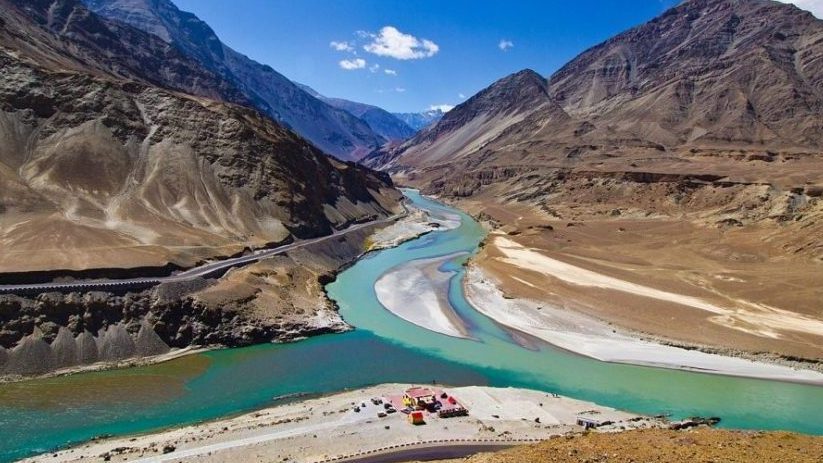BRAHMA CHELLANEY
 Despite India’s scrupulous observance of the treaty provisions and its concessions, Pakistan accuses it of not fully complying with the treaty’s terms.
Despite India’s scrupulous observance of the treaty provisions and its concessions, Pakistan accuses it of not fully complying with the treaty’s terms.
The Indus Waters Treaty (IWT), the most generous water-sharing pact in modern world history, remains a large millstone around India’s neck. Far from seeking to get rid of that millstone, India next weekend will welcome a three-member Pakistani team for an inspection tour of Indian hydropower projects in the basin of the Chenab, the largest of the six Indus-system rivers in terms of the rate of cross-border flow.
Contrast this with the record of other powers on binding accords. China’s 2017 breach of bilateral accords by denying India hydrological data resulted in many preventable deaths in Assam floods. The US is now dumping the Intermediate-Range Nuclear Forces Treaty after unilaterally terminating another IWT-style pact of unlimited duration — the Anti-Ballistic Missile Treaty.
A scofflaw Pakistan, despite being in dire financial straits, remains wedded to terrorism, including inflicting upon India death by a thousand cuts. Yet the much larger India, instead of imposing deterrent costs, continues to treat Pakistan with kid gloves, as underscored by the impending visit of the Indus commissioner-led Pakistani team.
While Pakistan flouts international norms and rules, India adheres to the IWT’s finer details — and goes even beyond. For example, under IWT’s Article VIII, the Permanent Indus Commission (PIC) is to meet once a year. Its next meeting was due in March 2019. But, thanks to India’s zealousness, the PIC met much earlier in August 2018, just five months after its previous meeting.
It was at that meeting that India agreed to advance Pakistan’s inspection tour to October 2018. The last such tour occurred in 2014 and the next one, in keeping with the IWT provision for a tour “once every five years”, was due by the end of 2019. The local bodies’ elections in Jammu and Kashmir forced the October tour to be deferred to January.
The Pakistani side, like in 2014, will use its upcoming tour to collect new information on Indian projects and then mount technical objections to their designs and seek international intercession. Even before the team’s visit, Pakistani officials have raised objections to the spillway or freeboard of the projects to be inspected.
The lopsided IWT, which keeps for India just 19.48% of the total Indus-system waters, is the world’s only inter-country water agreement embodying the doctrine of restricted sovereignty, which compels the upstream nation to forego major river uses for the benefit of the downstream state. India has failed to fully exercise even its IWT-truncated rights. For example, India has built no storage on the Chenab, Jhelum and the main Indus stream, although the IWT permits it to store 4.4 billion cubic meters of these rivers’ waters.
On the three rivers, India is allowed to build run-of-river hydropower plants without dam reservoirs. Yet India’s total installed generating capacity in J&K currently does not match the electric output of a single major dam in Pakistan, such as Tarbela, opened in 1976, or Diamer-Bhasha, whose construction is about to begin. In the lower basin, where India has full rights, the substantial waters of the Beas, Ravi and Sutlej untapped by it go to Pakistan as bonus outflows.
To bring Pakistan to heel, India needs to fashion water as an instrument of leverage. Such leverage can serve as the most potent instrument in India’s arsenal against Pakistan — more powerful than the nuclear-weapons option, which essentially is for deterrence. Building leverage in the Indus Basin is a cheaper option for India to reform Pakistan’s behaviour than fighting a war. Indeed, peaceful options — from mounting escalating riparian pressures to waging economic, cyber and diplomatic warfare — can effectively tame Pakistan.
India gains little from its present approach. For example, despite India’s scrupulous observance of the IWT provisions and its concessions, Pakistan accuses it of not fully complying with the treaty’s terms. Pakistan will never be satisfied. Nor will it stop internationalising every disagreement as part of its water-war strategy against India. Add to the picture its proxy war by terror. While trampling on basic norms, Pakistan claims interminable water rights.
In this light, an increasingly water-stressed India should unilaterally remake the terms of the Indus engagement. Four of the six Indus-system rivers originate in India. The other two begin as small rivers in Tibet and gain major flows in India. For starters, India should keep its Indus commissioner’s post vacant. Without formally withdrawing from the IWT, India must assert its upper-riparian rights. India cannot keep bearing IWT’s burdens without any tangible benefits accruing to it from the treaty.
No comments:
Post a Comment